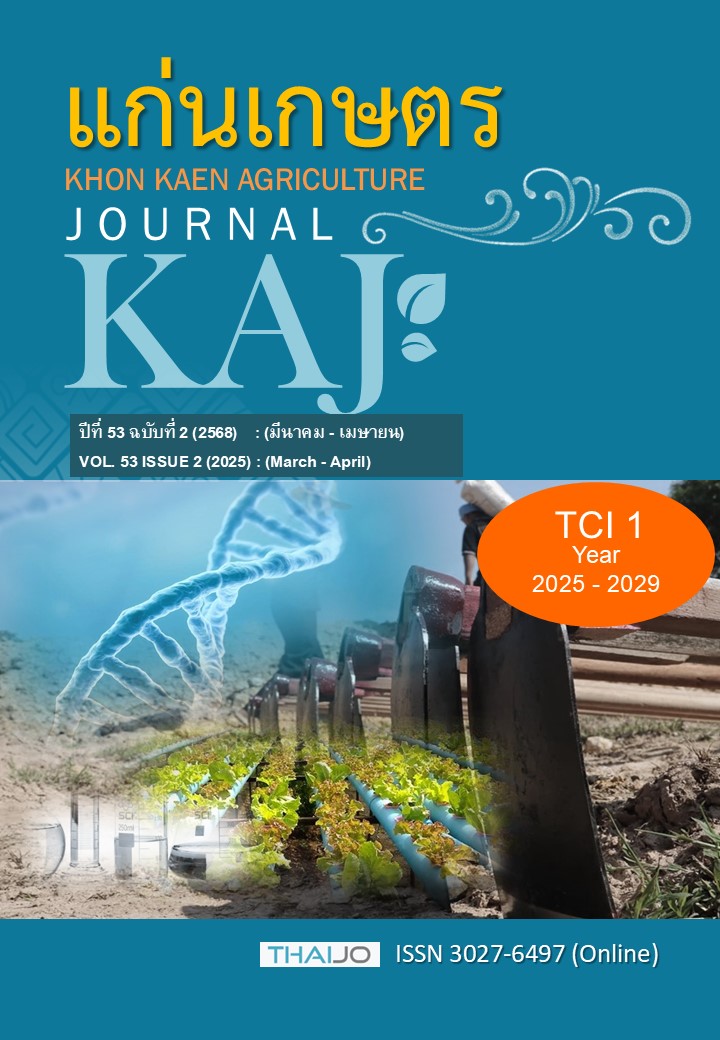Adaptation approaches in cashew nut cooperative management in Benin: Lessons from agricultural cooperative applying sufficiency economy philosophy in Thailand
Main Article Content
บทคัดย่อ
This study explored adaptation strategies for cashew nut cooperatives in Djougou, Benin, using Thailand’s Sufficiency Economy Philosophy (SEP) as a model, drawing insights from the cooperative in Tha Pla, Uttaradit, Thailand. Data from each cooperative were collected from five groups, with a total of 30 farmers in each cooperative. Questionnaires, surveys, and interviews focused on socio-demographic factors, cooperative structures, resource management, and the impact of SEP principles. Quantitative analysis revealed significant differences: the cooperative in Tha Pla, Uttaradit, comprising 90.00% women over the age of 50, demonstrated higher levels of education (100.00%) and income sufficiency (63.33%), alongside higher productivity (>400 kg/ha). In contrast, the Beninese cooperative, primarily male-led (86.70%) with a younger membership (70.00% between 31-50 years), showed lower education levels (66.67% illiteracy), income sufficiency (6.67%), and lower productivity (<400 kg/ha). The Thai cooperative demonstrated stronger management practices, achieving maximum scores of 16.00 in both material and financial management (16.00 vs. 12.00) and member services (16.00 vs. 11.00), highlighting more effective organizational functioning in Thailand. The overall satisfaction score of the cooperative services in Thailand was significantly higher than in Benin (3.71 ± 0.50 vs. 3.10 ± 0.30; t-test 16.18, P < 0.01). Addressing gaps in gender inclusivity, service provision, resource management, community development, and governance through SEP-driven strategies could significantly enhance the effectiveness and sustainability of Beninese cooperatives, following Thailand’s model. Given SEP’s success in Thailand, this study suggested that Benin consider adapting SEP principles or developing a similar framework to address these persistent challenges.
Article Details

อนุญาตภายใต้เงื่อนไข Creative Commons Attribution-NonCommercial-NoDerivatives 4.0 International License.
เอกสารอ้างอิง
Arise. 2023. How the cashew industry in Benin is elevating the economy and delighting taste buds worldwide. Arise IIP. Available: https://www.ariseiip.com/blog-cashew-industry-in-benin/. Accessed Dec.26, 2023.
Awoke, H. M. 2014. Enhancing member commitment in agricultural cooperatives: Evidence from east Gojjam Zone, Amhara region, Ethiopia (Master’s thesis). Wageningen University and Research Centre, Department of Social Sciences, Management Studies Group.
Dhirathiti, C. 2017. Philosophy of sufficiency economy: A philosophical analysis. Journal of Social Sciences. 47: 177-194.
Faysse, N., and W. Onsamran, 2018. The differing strategies of agriculture cooperatives in Thailand from managing market links to self-reliance. Journal of Community Development Research (Humanities and Social Sciences). 11: 13-26.
Houessou, D. M., B. G. J. S. Sonneveld, A. K. N. Aoudji, F. S. Thoto, S. A. R. Dossou, D. J. R. M. Snelder, A. A. Adegbidi, and T. D. Buning. 2019. How to transition from cooperations to cooperatives: A case study of the factors impacting the organization of urban gardeners in Benin. Sustainability. 11: 2-25.
Ibikoule, G. E., J. Lee, and L. A. Godonou. 2024. Smallholders’ vulnerability in the maize market: An analysis of marketing channels to improve the role of cooperatives in Benin. Heliyon. 10: 1-14.
Kinkingninhoun-Méda, F. M., A. Diagne, F. Simtowe, A. R. Agboh-Noameshie, and P. Y. Adégbola. 2008. Gender discrimination and its impact on income, productivity, and technical efficiency: Evidence from Benin. Agricultural and Human Values. 27: 57-69.
Manne, A. S. A, P. Jimmy, H. Edja, A. R. Nouhoun, M. Nasser Baco, and I. Moumouni. 2021. Analysis of the evolution of the regulatory and operational framework for the management of cooperatives in Benin. Journal of Agriculture and Environmental Sciences. 10: 28-44.
Pathaveerat, S., P. Pruengam, and N. Lekrungroenggid. 2024. The potential of cashew nut shell waste in charcoal briquettes after producing cashew nut shell liquid through cold extraction. Results in Engineering. 23: 1-9.
Phanthiam, M., and P. Taeporamaysamai. 2019. Factors affecting members’ participation in the business operation of agricultural cooperative in Thailand, pp. 268-276. In Proceedings of the International Academic Multidisciplinary Research Conference Switzerland 2019. Switzerland.
Poramacom, N. 2000. Agricultural credit provided by Bank for Agriculture and Agricultural Cooperatives (BAAC) and assets and indebtedness of farm households. Kasetsart Journal of Social Sciences. 21: 191–198.
Prabripu, P., and A. Wiboonpongse. 2021. SEP strategy for survival of the rice farming careers of small farming households in the upper Northern region of Thailand. International Journal of Agricultural Technology. 17: 641-660.
Prasertsri, P., T. Tong-un, T. Roengrit, Y. Kanpetta, J. Yamauchi, and N. Leelayuwat. 2016. Cashew apple juice supplementation increases endurance and strength performance in cyclists. Journal of Exercise Physiology Online. 19: 63-72.
Queens Project Office. 2022. One Gewog One Product (OGOP). Thimphu: Queens Projection Office.
Samakkarn, A., and P. Jiraudomsarod. 2024. Guidelines for developing accounting potential that affect the work success of cooperative accountants in Thailand. Journal of Cooperative Accounting Studies. 12: 92-109.
Sarapirom, K., and H. Sarkar. 2018. Study of sufficiency economy philosophy and its impact on individuals, communities and organizations. Thai Interdisciplinary Research. 13: 8-12.
Seneerattanaprayul, J., and C. Gan. 2021. Effects of agricultural cooperative services on rural household welfare in Thailand. International Social Science Journal. 74: 1468-2451.
Song, H. 2020. Sufficiency economy philosophy: Buddhism-based sustainability framework in Thailand. Business Strategy and Environment. 29: 2995-3005.
Suwanmanee, U., T. Bangjang, A. Kaewchada., and A. Jaree. 2020. Greenhouse gas emissions and energy assessment of modified diesohol using cashew nut shell liquid and biodiesel as additives. Sustainable Production and Consumption. 24: 232-253.
Tama-Imorou, C., and B. Wennink. 2007. ACooBéPA’s role in pro-poor service provision in Benin. P. 139-160. In: Wennink.B., S. Nederlof., and W. Heemskerk (eds.) Access of the poor to agricultural services: the role of farmers’organizations in social inclusion. Bulletin 376. Amsterdam: KIT Publishers.
United Nations. 2018. “We are liberated”: Women-led agricultural Savings and Loans Groups boost empowerment in Benin. UN Women Africa. Available: https://africa.unwomen.org/en/news-and-events/stories/2018/10/we-are-liberated-benin. Accessed Dec.26, 2023.
Wongkumchai, T., and S. Kiattisin. 2021. Information analysis and evaluation model (IAEM) of Thai economy sustainability based on SEP and SDGs. Heliyon. 7: 1-20.


